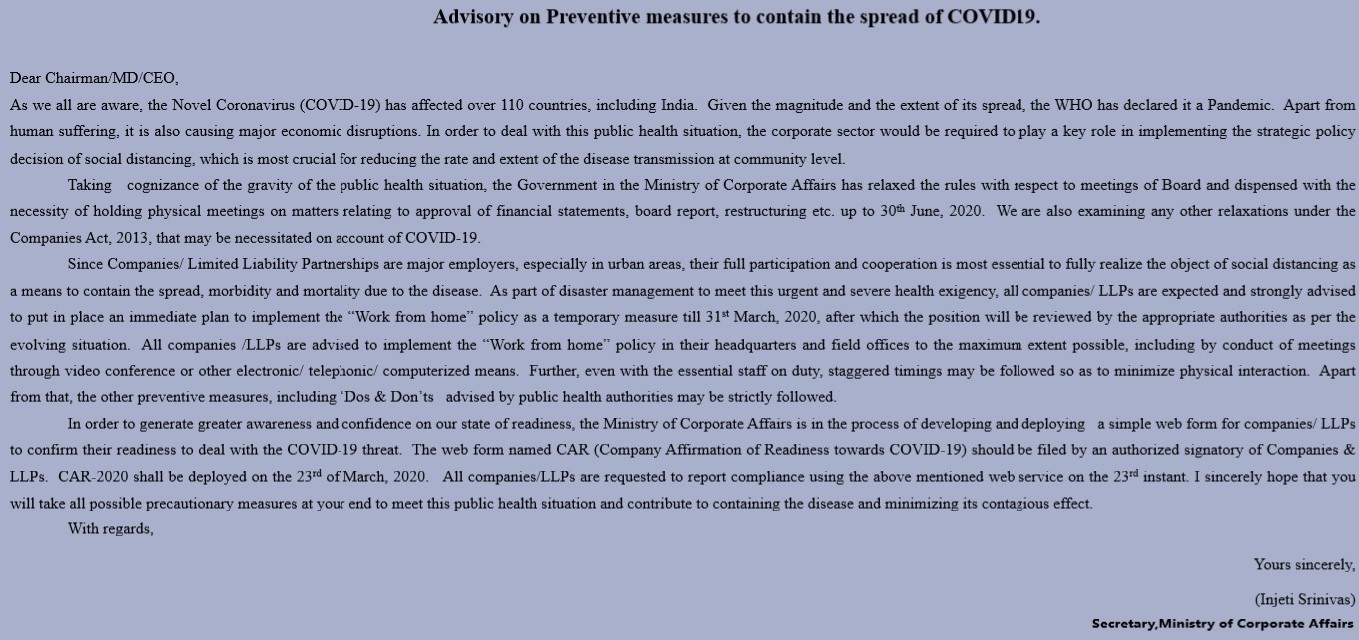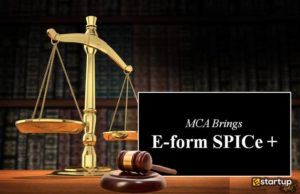Ministry of Corporate Affairs ( MCA ) has extended the period for names reserved and re-submission of forms.
Issue description and Period/Days of Extension are as below: –
Names reserved for 20 days for new company incorporation.
SPICe+ Part B needs to be filed within 20 days of name reservation- Names expiring any day between 15th March 2020 to 31st May would be extended by 20 days beyond 31st May 2020.
- Names reserved for 60 days for change of name of company. INC-24 needs to be filed within 60 days of name reservation.
Names expiring any day between 15th March 2020 to 31st May would be extended by 60 days beyond 31st May 2020. - Extension of RSUB validity for companies.
SRNs where last date of Resubmission (RSUB) falls between 15th March 2020 to 31st May 2020, additional 15 days beyond 31st May 2020 would be allowed. However, for SRNs already marked under NTBR, extension would be provided on case to case basis.
Note: Forms will not get marked to (Not to be taken on Record)’NTBR’ due to non-resubmission during this extended period as detailed above. It also includes IEPF Non-STP eForms ( IEPF3, IEPF-5 and IEPF-7) - Names reserved for 90 days for new LLP incorporation/change of name. FiLLiP/Form 5 needs to be filed within 90 days of name reservation.
Names expiring any day between 15th March 2020 to 31st May would be extended by 20 days beyond 31st May 2020. - RSUB validity extension for LLPs.
SRNs where last date of resubmission (RSUB) falls between 15th March 2020 to 31st May 2020, additional 15 days would be allowed from 31st May 2020 for resubmission. However, for SRNs already marked under NTBR, extension would be provided on case to case basis.
Note: Forms will not get marked to (Not to be taken on Record)’NTBR’ due to non-resubmission during this extended period as detailed above. - Extension for marking IEPF-5 SRNs to ‘Pending for Rejection u/r 7(3)’ and ‘Pending for Rejection u/r 7(7)’
SRNs where last date of filing eVerification Report (for both Normal as well as Resubmission filing) falls between 15th March 2020 to 31st May 2020, would be allowed to file the form till 30th Sep 2020. However, for SRNs already marked under ‘Pending for Rejection u/r 7(3)’ and ‘Pending for Rejection u/r 7(7)’, the extension would be provided on case to case basis.
Note: Status of IEPF-5 SRN will not change to ‘Pending for Rejection u/r 7(3)’ and ‘Pending for rejection u/r 7(7)’ till 30th Sep’20.






 As part of Government of India’s Ease of Doing Business (EODB) initiatives, the Ministry of Corporate Affairs would be shortly notifying & deploying a new Web Form christened ‘SPICe+’ (pronounced ‘SPICe Plus’) replacing the existing SPICe form.
As part of Government of India’s Ease of Doing Business (EODB) initiatives, the Ministry of Corporate Affairs would be shortly notifying & deploying a new Web Form christened ‘SPICe+’ (pronounced ‘SPICe Plus’) replacing the existing SPICe form.